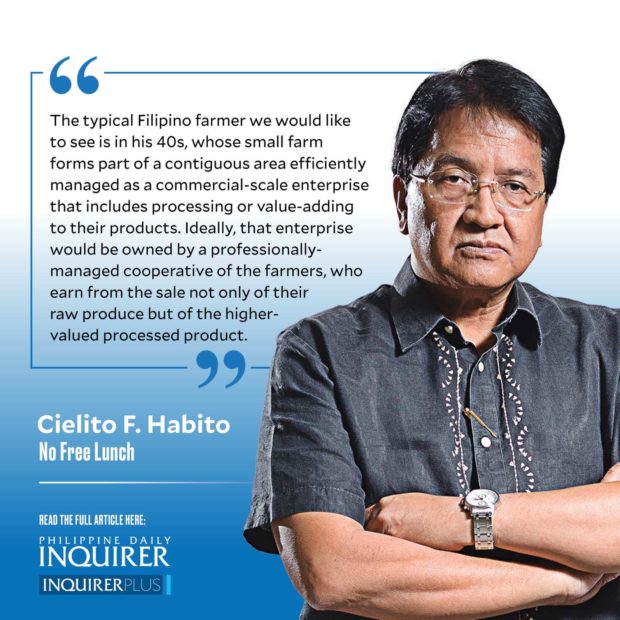Over 30 years ago, while attending a conference in Malaysia, we participants were brought on a field trip to the outskirts of Kuala Lumpur to visit what we were told was a typical Malaysian farming community. Their crop was oil palm, and the community was part of a nucleus farming estate, where smallholder farmers were clustered together forming a large, centrally-managed plantation cum processing plant. When we asked a random farmer what problems he faced, his reply was totally unexpected. He complained that his car was over five years old and needed to be replaced!
To our average farmer then and now, car ownership remains a distant dream. Today’s Filipino farmer typically farms about a hectare of land, is about 60 years old, and earns far less from his farm than what’s needed to support his family. The family thus earns more from off-farm work, maybe from someone driving a tricycle or habal-habal, or doing other informal work. Remittances may be coming in from a family member working elsewhere in the country or overseas. Not actively part of a farm organization or cooperative, he has never entered a bank, much less borrowed money from one, and is probably indebted to a trader to whom he is obliged to sell his harvest. He would typically do so at a price lower than what he could otherwise get if he had the freedom to sell his produce to someone else. But even if he did, he ends up selling to whichever trader comes along, as he finds transporting his produce to the nearest market or trading post too costly or too much trouble, especially given road conditions. Hardly has he seen a government extension worker, if at all, but gets occasional advice from fellow farmers, or from the guy who sells him farm inputs. With little technical guidance, infrastructure support, and working capital, his production costs much exceed those of his Thai or Vietnamese peers, whose products are blocked or restricted by our government to keep domestic prices high and keep him afloat.
Except for the average age that must have been much lower then, this was largely the same image of the Filipino farmer I encountered in the 1970s, when I spent time living among them while doing field research as a young agricultural economist. As we continue to grapple with the decades-old problem of how to uplift the lives of those who feed us, it’s perhaps best to start by defining the vision of the Filipino farmer we’d like to see—hopefully in the not too distant future.
The typical Filipino farmer we would like to see is in his 40s, whose small farm forms part of a contiguous area efficiently managed as a commercial-scale enterprise that includes processing or value-adding to their products. Ideally, that enterprise would be owned by a professionally-managed cooperative of the farmers, who earn from the sale not only of their raw produce but of the higher-valued processed product. Alternatively, a large firm could own the processing enterprise that maintains mutually-beneficial contract growing arrangements with the numerous organized farmers in the area, providing them professional management, technical support, and needed farm inputs.
The organized farmers can readily obtain financing from a bank (whether a rural bank, the Land Bank, or a private commercial bank) or a financial technology entity employing digital technology to consolidate funds from a large number of small investors. The farmer can thus obtain working capital that permits access to the most productive inputs and technologies, including digital technologies that raise productivity at the farm and processing levels, and link him/her directly to buyers. He/she constantly hears from the municipal agricultural officer who is technically supervised by the provincial agricultural office, which in turn receives constant technical guidance from the Department of Agriculture’s regional office. He/she feels no threat from imports, as his/her products can ably compete even in the export markets.
That farmer would be more aptly described as an agribusiness entrepreneur, who makes more than enough to support the family’s needs. And yes, he/she would own a car.
